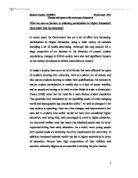Criticism of Affirmative Action As Seen on the College Campus
WBIS 188
October 1, 2012
Affirmative Action As Seen on the College Campus
“Affirmative action has a negative effect on our society when it means counting us like so many beans and dividing us into separate piles” (John Kasich). What John Kasich was trying to say here is that affirmative action does nothing but tear the society apart. It allows for people to be judged on their race rather than their merits and they are being accepted for all of the wrong reasons. Affirmative action is the practice, mainly used by institutions, that gives preferential treatment to minorities, those of different races, and women when deciding who gets the job, who receives the award, or even deciding whom to admit. Many universities across the United States have welcomed the movements of affirmative action with open arms. That being said, there are two sides to the story. Is it good or bad for the college campus? There are three negative outcomes of affirmative action; people earning their spot in their selected college solely based on who they are rather than what they have achieved, affirmative action does not achieve its goal of helping minority groups, and affirmative action does not lead to a truly diverse community within the Universities walls.
According to the book written by Dinesh D’Souza, Illiberal Education: The Politics of Race and Sex on Campus, a student with the name of Yat-pang Au received a rejection letter from the University of California at Berkeley. Yat-pang was more than qualified for the school. He was a varsity letter winner for both cross country and track, ran a Junior Achievement company and was elected to the student council as well as the school’s Supreme Court. Along with his achievements from school, he won seven scholarships and other numerous awards. Yat-pang assumed that he was not admitted because he wasn’t good enough and the university had standards that were too high. Soon enough, Yat-pang figured out that students with credentials not as high as his were admitted to the same college. “Yat-pang Au was indeed refused admission to Berkley on the grounds of his race. University officials admit this denial is regrettable but argue that the Au family should understand that Berkeley is attempting a grand project to secure racial justice and multicultural diversity in America” (D’Souza, 26). In this case, the student got rejected solely because of his race whereas students of different races were admitted. When colleges are admitting students; grades, extra-curricular activities, and test scores should all be taken into account. The student’s race should not play a part in the selection process because that is something that is completely out of the student’s control. This form of stereotyping preserves the indifferences that affirmative action strives to rule out.








